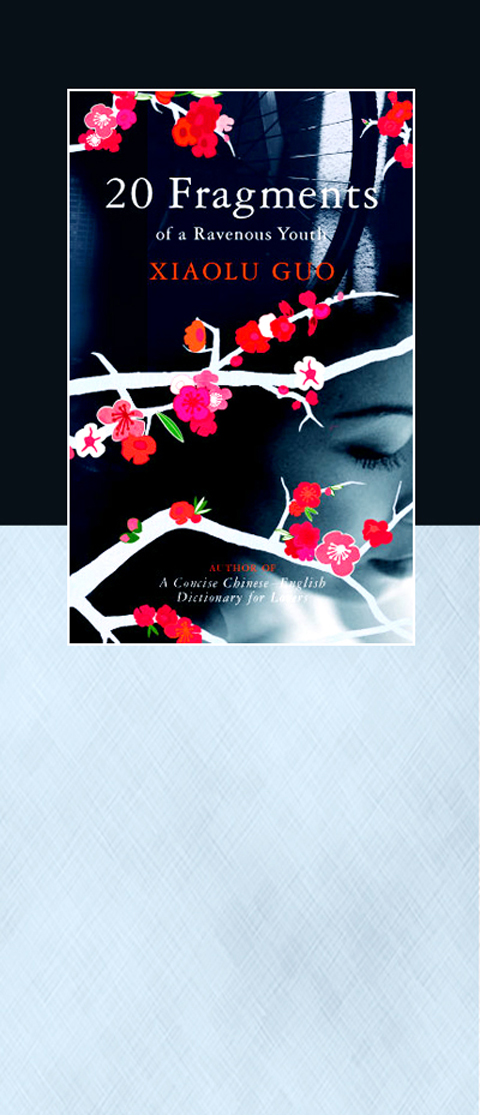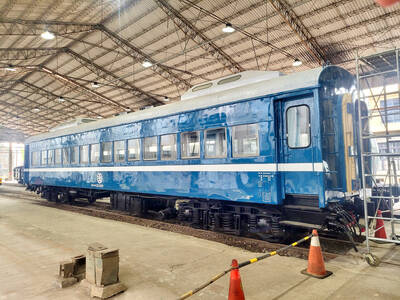20 Fragments of a Ravenous Youth is Xiaolu Guo’s (郭小櫓) latest publication in English, issued to coincide with the appearance in paperback of her A Concise Chinese-English Dictionary for Lovers. When I reviewed the same author’s Village of Stone [Taipei Times, May 4, 2004] I said she was lucky to have been taken up by a publishing giant like Random House, and that if her novel had been set in Cleveland, Ohio, rather than China it may well not have found a publisher at all. This book, however, feels quite a lot better.
It has the same terseness and episodic nature, though. It’s easy to read and in no way intellectually challenging. Each of its 20 chapters offers a glimpse into the life of a country girl, Fenfang, newly arrived in Beijing and looking for a job, not to mention a direction in life. She beds down with someone called Xiaolin who she meets when working as a film extra, then with a young American from Boston called Ben. She dreams of getting a speaking part in a movie — any movie — but is persuaded by a serious-minded friend called Huizi to try her hand at scriptwriting. The novel ends with her getting a film synopsis, The Seven Reincarnations of Hao An, (printed here in full) accepted by an underground film director.
The originality of her script, she says, was that it was about someone totally unexceptional, an ordinary Chinese man baffled and finally defeated by the modern world. This is very much what this novel is about — ordinary people, the “extras” of a big city. The difference is that its narrator is canny and persistent enough to come up trumps in the end.

However you look at it, this is a “youth” novel. It’s about the narrator’s youth. It was the first novel the then very young Guo published in China 10 years ago. And here, in its new English-language incarnation, it still bears all the hallmarks of a work aimed predominantly at a young readership.
It’s also clearly very much an autobiographical novel. After being born in a fishing village on the south China coast (the “village of stone” of her 2004 novel), Guo studied at the Beijing Film Academy, and then went to live in London, and after that Paris. But she managed, nonetheless, to publish six books in China before she left.
In a note, Guo comments that it’s hard to return to a book written 10 years ago in order to oversee its translation into English, and that she no longer views things quite the way she did. But by working closely with her “youthful translators” (note the youth touch again) she has managed, she says, to create a language appropriate to “the elusive Fenfang.”
And the book is indeed full of nicely turned phrases and incisive short sentences. It isn’t Tolstoy, but it’s fresh, clean and, as far as it’s possible to tell, truthful. It avoids the pitfalls of pornographic passages (there are no sex scenes as such) and, though Fenfang frequently appeals to a “Heavenly Bastard in the Sky,” the tone is generally and good-natured and lightweight.
Here are some instances of her, or her translators’, easy and natural way with words: Cockroaches “sat in my rice-cooker pondering the meaning of life”; Fenfang’s unruly hair was like the weeds in the sweet-potato fields back home — vigorous, stubborn and “strong to no purpose”; When the narrator returns home she finds it both strange and over-familiar; “The damp night breeze was the same that had blown across my pillow as a child”; “As I was dragging my suitcase off the train, I saw an old woman with a decayed body and awful clothes. It was my mother.”
Guo displays an inclination to make general statements, too. “Family members always hurt each other.” “We repeat ourselves in life — the same habits, over and over again.” “Humans need cages round their bodies — wombs, houses, coffins.” The book’s Hello Kitty aspect, in other words, is quite frequently seasoned with more thoughtful material.
Guo is, needless to say, a rebel, as must be expected of someone who’s emigrated to Europe and is writing for the young. She loves China’s pirated books and films, for instance — piracy, her narrator says, was her university and only path to the foreign world. The police get short shrift — one officer is made to tell another not to worry about Fenfang after she’s been wrongfully arrested. She deserved everything she got because she was “much too individualistic.”
The narrator also belittles the Neighborhood Committees that she feels are spying on her comings and goings. “In my village we used to call them old cocks and old hens. They would sit for hours in the dust, red armbands on their sleeves, serving their everlasting socialism. Heavenly Bastard in the Sky, how I hated them.”
At one point Huizi remarks, “Fenfang, yours is the face of a post-modern woman.” And in a sense this book is an attempt at a post-modern novel — chirpy, observant, clever here and there, and everywhere instantly accessible. The narrator mentions in passing such mentors as Walt Whitman, Tennessee Williams and Marguerite Duras, but this is good post-modern practice — seriousness hinted at, but not investigated. Again, the text is interspersed with black-and-white photos of China — probably taken by the author, as Fenfang remarks on how much she enjoys taking pictures of Chinese daily life.
There are many pert obser-vations in this novel — about pet dogs, strange drinks and weird minor characters. And it’s true that the book as a whole is novelistic fast food. But like so much fast food, it’s not altogether unattractive.

Feb. 17 to Feb. 23 “Japanese city is bombed,” screamed the banner in bold capital letters spanning the front page of the US daily New Castle News on Feb. 24, 1938. This was big news across the globe, as Japan had not been bombarded since Western forces attacked Shimonoseki in 1864. “Numerous Japanese citizens were killed and injured today when eight Chinese planes bombed Taihoku, capital of Formosa, and other nearby cities in the first Chinese air raid anywhere in the Japanese empire,” the subhead clarified. The target was the Matsuyama Airfield (today’s Songshan Airport in Taipei), which

China has begun recruiting for a planetary defense force after risk assessments determined that an asteroid could conceivably hit Earth in 2032. Job ads posted online by China’s State Administration of Science, Technology and Industry for National Defence (SASTIND) this week, sought young loyal graduates focused on aerospace engineering, international cooperation and asteroid detection. The recruitment drive comes amid increasing focus on an asteroid with a low — but growing — likelihood of hitting earth in seven years. The 2024 YR4 asteroid is at the top of the European and US space agencies’ risk lists, and last week analysts increased their probability

For decades, Taiwan Railway trains were built and serviced at the Taipei Railway Workshop, originally built on a flat piece of land far from the city center. As the city grew up around it, however, space became limited, flooding became more commonplace and the noise and air pollution from the workshop started to affect more and more people. Between 2011 and 2013, the workshop was moved to Taoyuan and the Taipei location was retired. Work on preserving this cultural asset began immediately and we now have a unique opportunity to see the birth of a museum. The Preparatory Office of National

On Jan. 17, Beijing announced that it would allow residents of Shanghai and Fujian Province to visit Taiwan. The two sides are still working out the details. President William Lai (賴清德) has been promoting cross-strait tourism, perhaps to soften the People’s Republic of China’s (PRC) attitudes, perhaps as a sop to international and local opinion leaders. Likely the latter, since many observers understand that the twin drivers of cross-strait tourism — the belief that Chinese tourists will bring money into Taiwan, and the belief that tourism will create better relations — are both false. CHINESE TOURISM PIPE DREAM Back in July